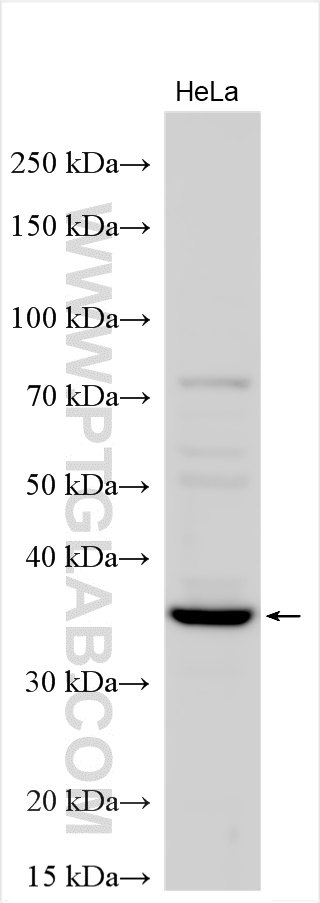验证数据展示
经过测试的应用
| Positive WB detected in | HeLa cells |
推荐稀释比
| 应用 | 推荐稀释比 |
|---|---|
| Western Blot (WB) | WB : 1:500-1:2000 |
| It is recommended that this reagent should be titrated in each testing system to obtain optimal results. | |
| Sample-dependent, Check data in validation data gallery. | |
发表文章中的应用
| WB | See 1 publications below |
产品信息
26810-1-AP targets DTWD1 in WB, ELISA applications and shows reactivity with human samples.
| 经测试应用 | WB, ELISA Application Description |
| 文献引用应用 | WB |
| 经测试反应性 | human |
| 文献引用反应性 | human |
| 免疫原 |
CatNo: Ag25170 Product name: Recombinant human DTWD1 protein Source: e coli.-derived, PET30a Tag: 6*His Domain: 1-304 aa of BC032535 Sequence: MSLNPPIFLKRSEENSSKFVETKQSQTTSIASEDPLQNLCLASQEVLQKAQQSGRSKCLKCGGSRMFYCYTCYVPVENVPIEQIPLVKLPLKIDIIKHPNETDGKSTAIHAKLLAPEFVNIYTYPCIPEYEEKDHEVALIFPGPQSISIKDISFHLQKRIQNNVRGKNDDPDKPSFKRKRTEEQEFCDLNDSKCKGTTLKKIIFIDSTWNQTNKIFTDERLQGLLQVELKTRKTCFWRHQKGKPDTFLSTIEAIYYFLVDYHTDILKEKYRGQYDNLLFFYSFMYQLIKNAKCSGDKETGKLTH 种属同源性预测 |
| 宿主/亚型 | Rabbit / IgG |
| 抗体类别 | Polyclonal |
| 产品类型 | Antibody |
| 全称 | DTW domain containing 1 |
| 别名 | DTW domain containing 1, DTWD1, MDS009 |
| 计算分子量 | 35 kDa |
| 观测分子量 | 35 kDa |
| GenBank蛋白编号 | BC032535 |
| 基因名称 | DTWD1 |
| Gene ID (NCBI) | 56986 |
| RRID | AB_3085907 |
| 偶联类型 | Unconjugated |
| 形式 | Liquid |
| 纯化方式 | Antigen affinity purification |
| UNIPROT ID | Q8N5C7 |
| 储存缓冲液 | PBS with 0.02% sodium azide and 50% glycerol, pH 7.3. |
| 储存条件 | Store at -20°C. Stable for one year after shipment. Aliquoting is unnecessary for -20oC storage. |
背景介绍
DTW domain-containing protein 1 (DTWD1), also named as tRNA-uridine aminocarboxypropyltransferase 1, is responsible for 3-(3-amino-3-carboxypropyl)uridine modification at position 20 in the D-loop of certain tRNAs (PMID: 31804502; 37745798). DTWD1 has been identified as a target gene of p53 and functions as a tumor suppressor gene (PMID: 25973305). Dysregulated expression of DTWD1 has been reported in several malignancies, including gastric cancer and colorectal cancer (PMID: 25973305; 31924336).
实验方案
| Product Specific Protocols | |
|---|---|
| WB protocol for DTWD1 antibody 26810-1-AP | Download protocol |
| Standard Protocols | |
|---|---|
| Click here to view our Standard Protocols |
发表文章
| Species | Application | Title |
|---|---|---|
J Hematol Oncol Novel potent molecular glue degraders against broad range of hematological cancer cell lines via multiple neosubstrates degradation | ||
J Med Chem Discovery of Novel Potent Triple IKZF1/2/3 Degraders for the Treatment of Hematological Cancers |


